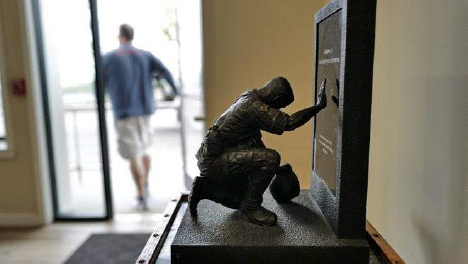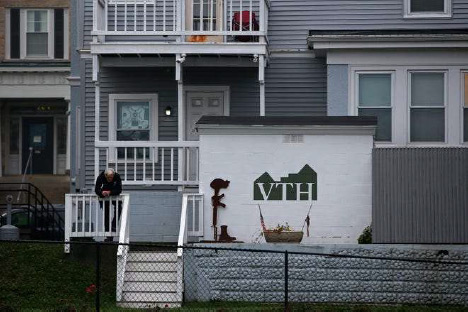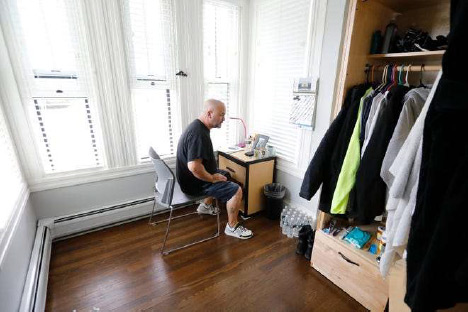Standard-Times
Making up for lost time: After COVID hold-ups, VTH is bigger than ever
Non-profit’s growth includes four-times the permanent housing, expanded scope of services and more
Matthew Ferreira
NEW BEDFORD — The year 2020 was supposed to mark a new beginning for the Veterans Transition House in New Bedford, as the non-profit founded in 1990 to help veterans get back on their feet stood on the verge of multiple long-awaited projects coming to fruition, including a 20- bed transitional housing unit, 30 newly constructed units of permanent housing with commercial kitchen to serve meals, as well as a community outreach center and new programming to go along with it. But, while plans were able to move forward in some cases, the most outward-facing aspect meant to be the harbinger of the $10 million expansion fell on bad timing with the onset of the COVID-19 pandemic.
“It was really kind of anti-climactic,” said VTH Outreach Director Catherine Buckley. “It was June 2020 when we occupied these buildings, and then we had to hold off for around two years before we could really open up the front door and say come in and see what we have to offer.”
While the “grand opening” envisioned wouldn’t come to pass, staff members say initial plans have recently come to fruition, albeit in a quieter fashion than anticipated. Having gone from 11 to 41 permanent housing units as well as new and renovated transitional housing spaces — with completion of the latter allowing transitional residents to move out of temporary digs at the St. John the Baptist Church rectory — the VTH stood more ready than ever to help veterans with their housing needs, but this past August is when outreach efforts began to resemble the original vision, Buckley said, noting an influx of referrals thereafter, especially for transitional housing. “Since COVID has luckily toned down a little bit, we’ve been able to really get out there and reach out to people in ways we couldn’t before,” Buckley said.
Making up for lost time — and then some
Not only is the outreach center at 1297 Purchase St. now up and running, but thanks to some unexpected additional funding, VTH staff say they were able to hire new outreach team members, broadening the scope of the organization’s capabilities beyond its initial vision of growth.
“That’s when things really took off,” Buckley said, noting having hired an employment/training specialist, housing/support specialist, a transport driver, and a general outreach clinician specializing in “boots on the ground” work, as she described it: “He has certain days where he attends certain food pantries, scheduling some appointments with local hospitals, and connecting more recently with the Bristol County jails as well. So he tried to schedule his work on where he thinks veterans might likely be in the community.
“It’s only been since August for them, so things have been happening really fast,” Buckley said.
A look at VTH’s monthly reporting shows 47 total outreach services were provided to 12 veterans in July, compared to 137 services to 37 veterans in August. “As the colder months arrive there will be a greater need thus giving us additional opportunities to connect with vets within the community,” Buckley said.

According to Stripinis, the funds that made hiring the new outreach team possible came as a result of the efforts of state Senator Mark Montigny’s office — a welcomed boost for the VTH, especially after the non-profit’s long-awaited new chapter so abruptly turned to a “grand closing,” as Stripinis put it. “We had a small earmark of under $100,000 for a couple of years, but now … we were able to get the Mass. Department of Veterans Services to loosen up their coffers and now it’s up to $424,000.
“We’re hoping that’s going to be renewable for up to five years to fund the operations of the outreach center.”
Another upturn for the VTH came through U.S. Congressman Bill Keating’s office, Stripinis said, in the form of $375,000 that will fund new state-of-the-art software for more comprehensive, modernized record-keeping. While acknowledging it’s likely not the most intriguing development as far as the public would be concerned, Stripinis says the impact it will have on internal operations at the VTH will have an outward effect. “People don’t want to be shuffling paper files and be logging onto 27 different systems all day long. With this, we’ll get more done and keep much better records,” Stripinis said. “And when funding opportunities come up, it can be harder than you think to tell the story of the needs you have, so being able to quickly pull data and look through everything in one place will be a huge help in that way as well.”
VTH’s permanent housing boom
Having nearly quadrupled its unit count, VTH’s 41 units of permanent housing are now spread between four buildings at 1333 Purchase St. and the surrounding area, consisting of a mix of SRO (single-room occupancy), studio, and 1-2 bedroom apartments for qualified veterans.
While the veterans who live in permanent reduced rent VTH housing have established a level of stability and independence, VTH Programs Director Leah Berg says they are not left to fend entirely for themselves. “We have a 20-hour a week case manager in that building (1333 Purchase St.) that can help our folks with any type of social service needs they might have,” Berg said. “If you get behind on rent, she can help you work on budgeting, applying for food stamps … those kinds of things. She’s there to make sure their needs are getting met and they’re able to stay in housing.”

Aside from the actual housing units being utilized, another aspect of the original $10 million expansion able to quietly proceed as planned through the pandemic was the commercial kitchen and dining area located within the 1333 Purchase St. permanent housing complex. “We have a cook that’s full-time so we’re able to serve meals five days a week,” said VTH Executive Director Jim Reid. “We’ve made and served over 14,000 meals just this past year.”
Currently, all permanent housing units are occupied, Stripinis said.
Transitioning to brighter days
When it comes to the VTH’s total 44 units of transitional housing, there is a range of accommodation types to suit various levels and types of need, Berg said. The seven-bed, Veterans Affairs-funded clinical treatment house at 1066 Pleasant St. is staffed part-time — with Buckley serving as clinician there — and is reserved for veterans with mental health needs, Berg said; while the 12 Veterans Affairs-funded service intensive beds at 98 Arnold St., despite what their given label may suggest, are actually the least intensive accommodations, intended for veterans who’ve simply fallen on hard times financially and need time to catch up.
The 25-bed Department of Veterans Services-funded facility at 344 County St. is described by Berg as the VTH’s most intensive type of transitional housing, staffed 24/7 and primarily reserved for veterans struggling with addiction issues. “The majority of residents there are trying to work recovery programs,” Berg said. “Our first floor is also handicap-accessible, so currently we have two veterans in wheelchairs there.”
Transitional housing is currently at 85% total occupancy, with a waiting list for service intensive beds, Stripinis said.
When the struggle is real, but less lonely
“They’ve given me a roof over my head and a second chance at life,” said current transitional housing resident William “Willy” Lake.
After Lake — who grew up in Wareham — was honorably discharged from the Army in 1991 at age 21 for mental health-related reasons, he spent the following decades battling addictions to alcohol and cocaine in a cycle of sobriety and relapse — problems that he says started after trauma experienced while stationed abroad. “I started using and boozing in Korea,” said Lake, now 51. “I mean, yeah, I drank in high school but the cocaine and drug use started there.”
His last relapse was in 2020, at which point Lake says he’d had enough. “It was my first goaround with the VA system and I was fortunate enough to land here,” he said. “Instead of being homeless, helpless and desperate, they’ve given me a roof over my head. I try to show my gratitude in the way I help to keep the facilities up with the cleanliness and stuff, which is something that’s asked of us when we’re welcomed in.”
Having experienced addiction rehab settings in the past, Lake — who began living in transitional housing in August 2020 — says the unique setting provided by VTH has worked well for him, enabling him to stay sober over the course of his stay thus far.
“I like the structure — clean and sober living, five mandatory morning meetings,” Lake said. “You don’t have time to think about going out and using or doing the ‘stinkin’ thinkin’’ thing, getting in your own head.”
While Lake says he does feel supported by the VTH, life’s stresses don’t pause for recovery — which for him currently include difficulties reinstating his driver’s license and missing his two young children — as he tries to get his affairs in order in preparation for his allotted time in transitional housing to run out. “You have up to two years and it’s looking like I may have to take advantage of the full two,” he said, noting that he’s been in the process of challenging an initial denial of social security benefits despite having been pronounced “unemployable” since his Army discharge. Lake said he’s currently the longest-standing resident in his building.
“I’ve gotta be out in 10 months and the clock is ticking,” Lake said noting upcoming dates for a hearing on social security and an appointment with the RMV about his driver’s license. “I’m not going to get my hopes up but I fear for my future so I’m keeping my fingers crossed.
“You see the tent cities all through Boston, New Bedford, Fairhaven and I’m wondering if that’s going to be me.”

According to Lake, permanent veterans housing is less than financially feasible in his situation, especially without knowing what will come of his social security hearing, due to the percentage of income required not taking into account the portion paid for child support.
Despite all the unsurety that currently marks his outlook on the future, Lake says he hasn’t lost sight of the fact he’s in a much better position with the VTH’s assistance than he would likely be otherwise. “They helped me knock off the 101 hours of community service I needed for unpaid probation fees, they give me rides to make sure I get to where I need to go,” he said. “Sometimes I feel like I’ve got nothing done since I’ve been here but really, without this place, I don’t know where I’d be.”
‘I needed a program like this’
Second chances are a common theme among stories that come out of VTH experiences, but if an initial stay is what counts as chance No. 2, then former transitional housing resident Craig Wood says he was fortunate enough to have a third.
“Around 2016 I went to detox like 21 times in Brockton and they said why don’t you try something different,” Wood said, noting he lived north of Boston at the time. “So when I rolled in the van down here I had 35 cents, dirty clothes, I had an apartment but I had sold everything for crack.
“Detoxing is not living — I needed a program like this,” Wood said.
After leaving the VTH just shy of his two-year limit, Wood says he was out on his own for about a year before old habits made it so he’d “lost everything again,” landing him back at the VTH where he stayed this time till 2021.
Not unlike Lake, Wood — who served in the Navy from 1979 to 1983 — says the more allencompassing approach of the VTH is what makes it different from other programs with similar aims. “They left enough rope to hang yourself with but it’s structured so you’re not as likely to,” he said, noting the rigorous schedule of treatment programming and the level of accountability residents are held to as factors that set the VTH apart; not to mention the impact of being shown compassion during trying times. “They were giving us Christmas presents, good holiday meals — it’s not like that everywhere. There’s all kinds of programs … but this is a step up.”
Since leaving transitional housing for the second time, Wood says he’s managed to take what he learned there and use it to build and maintain his new life thus far, improving his credit score, building up savings, buying a car, securing jobs and settling into a condominium in Fairhaven. “Don’t burn any bridges,” Wood said of one lesson he feels his experience emphasizes. “I was lucky they let me in again. If not, I don’t know what would’ve happened.”

